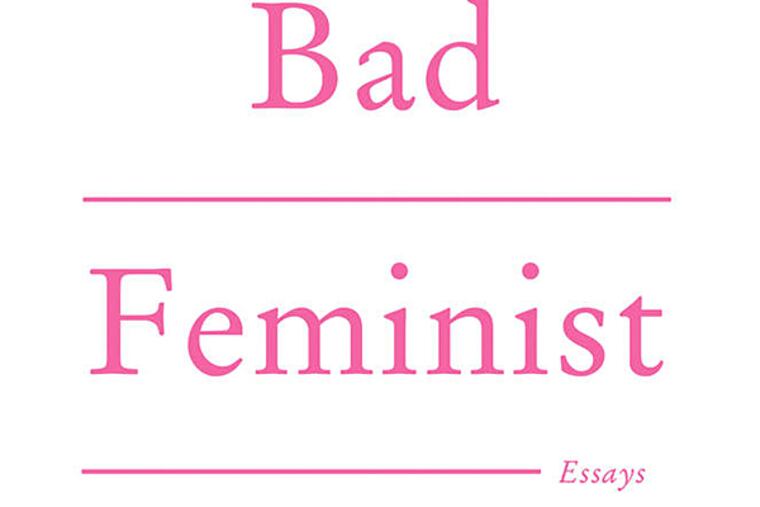Essay collection is sharp, smart
Roxane Gay's star has been rising recently, and if she's not yet an Important Writer, she's certainly One to Watch. This year, her novel An Untamed State was published to seemingly universal critical acclaim.

Bad Feminist
Essays
By Roxane Gay
Harper Perennial. 336 pp. $15.99 paper
nolead ends nolead begins
Reviewed by Katie Haegele
Roxane Gay's star has been rising recently, and if she's not yet an Important Writer, she's certainly One to Watch. This year, her novel An Untamed State was published to seemingly universal critical acclaim.
As a culture critic, Gay has X-ray eyes. Her writing is smart and trenchant, but she has something else as well, a hard-to-define quality that makes her readers root for her. She's disarming and one of us, only smarter. She has a tumblr and she writes about Internet dating. We love her, you know?
For the most part, this new collection of personal essays and criticism doesn't let us down. There are some problems, but first the good stuff.
Feminist book nerds will thrill to her references: Judith Butler, Kate Zambreno, Jessica and Elizabeth Wakefield from Sweet Valley High. Her topics are varied and often charming. She's included a heavily footnoted piece about her experiences as a competitive Scrabble player, a numbered list called "How to Be Friends With Another Woman" that tiptoes into Nora Ephron territory, and a moving essay about how Vanessa Williams' reign as Miss America gave her a beautiful reflection of herself to look at as a child.
When it comes to droll understatement, Gay reigns supreme. In "How We All Lose" she quotes Senate candidate Richard Mourdock's comment during a debate on rape and abortion. He said, "Even when life begins in that horrible situation of rape . . . it is something God intended to happen." Gay's response? "I am reminded that women, more often than not, are the recipients of God's intentions."
An African American who is the daughter of Haitian immigrants and who has a Ph.D. and arms covered in arty tattoos, Gay introduces a more nuanced view of "privilege" than we often get from activists and critics who overuse the word. Again and again, she encourages us - and helps us - to look deeper, to understand better.
Gay knows pop culture and is a huge reader of all kinds of books: "highbrow, lowbrow, I'm into all of it." It's a pleasure to read her thoughts on dumb movies and books for teens, which she uses as a way to talk about more serious ideas. She makes no bones about how disappointing she finds Tyler Perry's "morality story" movies, especially with their chastising messages for black women, and finds it sad that, with so few decent representations of themselves available, black viewers are expected to be content with "scraps from the table."
Her piece on the HBO show Girls - which has gotten a lot of overblown praise as well as some scorching criticism for its failure to acknowledge people of color in its version of New York City, and which is a show Gay enjoys in some ways - is incisive criticism that could, if you needed it to, be summed up entirely in this gorgeous one-liner: "We put a lot of responsibility on popular culture, particularly when some pop artifact somehow distinguishes itself as not terrible."
But there are awkward moments in the book, too. Many of the pieces - most of which touch on painful themes such as the immigrant experience in America, sexism in the workplace, and racism everywhere - showcase a curious trademark of Gay's writing: her apparent total lack of rage. Too often, she muffles her harder feelings under light-touch jokes that make it difficult to know whether she means what she says or whether she's talking in code. (And if so, why?)
In an essay on the bizarre and destructive ways journalists report rape, she cites example after example in a tone that is curiously dry, almost boring. At one point, she quotes Sarah Nicole Prickett's essay "Your Friends and Rapists," a dissection of the culture of violence against women that is bright with Prickett's anger and humor. We can't help but see Gay's writing on the topic as pale and pious in comparison.
When she gets past whatever it is that holds her back, though, the effect is stunning. In an essay ostensibly about the Hunger Games books and movies, Gay tells the harrowing story of the rape she suffered as a child, and here the feeling - measured and meticulously written though it is - comes to the surface. It seems that when Gay allows herself to get more personal, her writing blooms, and the concerns of her real life intersect with her observations on the larger culture in a way that illuminates both.
The book's title is itself a bit of waggish humor - and one that works, since we know, of course, that she's not bad at feminism at all. She likes the Ying Yang Twins, she writes, and she dreams of owning a closet full of pretty outfits. She offers these as evidence of her bad feminism, and we know she's only half kidding. In this way, Gay gently teases out what's most difficult about "being" a feminist, which is that the rules for living correctly are so hard on women, and they're always changing.
Finishing this book, we're left with the impression of a smart person who's impressive on a personal level, too. A brave person who often does difficult things because they're worth doing, a university professor who runs into the bathroom to vomit before every first class of the new semester because "I'm afraid of public speaking, which makes teaching complicated."
But is it complicated? Or is it just hard?